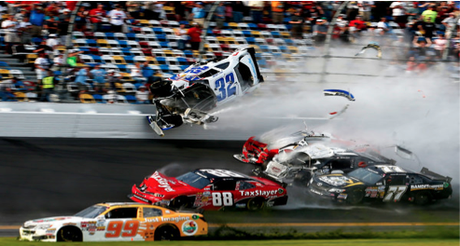Nearly every company will face some kind of crisis or unfavorable event. We hear about ways that companies handle bad situations all the time – mostly via social media.
One of the most recent happenings that was discussed heavily on social media is the NASCAR Nationwide race and the awful crash that happened at the end of the race. During the last lap of the Nationwide 300 at the Daytona Speedway on February 23rd, a wreck happened on the track and large pieces of debris from the cars affected flew into the stands and injured at least 30 people, some critically. NASCAR is being criticized by many people for not formulating a proper response to what was a very touchy situation. Several articles were written about the incident,including this article from socialmediatoday.com that discusses what NASCAR’s response (or non-response) via social media.

Photo source: Chris Graythen/Getty Images
Several race fans caught the wreck on their own video cameras or phones. A video of the crash that was taken from the stands was almost immediately uploaded to YouTube. NASCAR responded quickly, asking YouTube to remove the video. NASCAR was also criticized for not so much as acknowledging the accident on any of it’s social media pages. In fact, the only thing that the organization posted in the hours following the crash was promoting the Daytona 500 that was happening the next day. The YouTube video has since been restored, but it’s too late for NASCAR to correct their response.
Other companies can certainly take a lesson from the negative attention that NASCAR has garnered from this incident. Here are some tips on how companies can properly manage their crisis communication via email:
Apologize, apologize, apologize. You know the old saying, “the customer is always right?” well, this adage is fitting for crisis response as well.For a company to manage themselves effectively during trying times, they should nearly always shoulder the blame, even if they didn’t do anything to cause the problem (as is the case with the NASCAR accident). Fans want to hear that the company not only acknowledges that there is an issue, but that they are sorry that it happened.
Respond to inquiries from followers. Instead of ignoring questions or posting things that are unrelated, companies are wise to respond to questions or comments from followers. Even a short and simple response such as “we are looking into the matter further” or “we are deeply disappointed that this happened” are better than no response at all.
Be proactive. Companies should train their social media staff to respond quickly to a crisis. Instead of taking hours or even days to post an official statement about what happened, staffers should be trained to come up with a response quickly and get it issued right away. It doesn’t have to be complicated, but people should know that the company is aware of the situation and working as quickly as possible to correct it. Companies should also avoid posting unrelated statuses or Tweeting about other events, etc., until a response has been issued; it can seem disingenuous and like you are ignoring what happened.
A new year is a great time to re-think your internet marketing strategy, including social media strategy. The same goes for crisis management. If your company doesn’t have a plan in place, now is a great time to think ahead.

